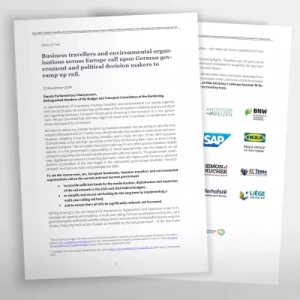 Through co-signing an open letter (published on 21. November), EPF joined a Europe-wide alliance of business travellers urging the current and future German government to create the necessary conditions for the reliable expansion, modernisation, and renovation of Germany’s rail network.
Through co-signing an open letter (published on 21. November), EPF joined a Europe-wide alliance of business travellers urging the current and future German government to create the necessary conditions for the reliable expansion, modernisation, and renovation of Germany’s rail network.
The open letter has been signed by a wide range of associations, companies, and organisations from across the EU and beyond, including EPF, German Watch, the Anders Reizen alliance, DAX-listed SAP, IKEA Holding Ingka, the architecture and engineering consultancy Sweco, the University of Liège, and an opera house. The letter was coordinated by Transport & Environment, Germanwatch, and the VCD.
The letter emphasises the commitment of the signatories to reduce their climate footprint as business travellers, expressing their willingness to choose rail over air travel. The organisations highlight that rail is 7,7 times more climate-friendly than aviation for national connections. However, they stress that reliability and predictability are crucial for business travellers, pointing to the concerning fact that, in 2024, less than two-thirds of Deutsche Bahn’s long-distance trains were on time, even with the UEFA European Championship approaching.
The letter, addressed to Members of Parliament from the transport and budget committees, calls for sufficient funding in the 2025 federal budget to modernise, digitalise, and expand the rail network. It also advocates for the creation of a rolling rail fund to simplify and secure long-term financing, as well as a significant reduction in rail tolls.
Hugo Houppermans, Director of the Dutch business travellers coalition Anders Reizen, representing 70 multinational corporations, stated, “The stakes are often too high to deal with a large amount of uncertainty. Many of the organisations in our coalition prioritise trains over planes. The trains from Amsterdam to London and Paris are usually fully booked, but the demand for trains going to and through Germany has been declining due to unreliability. This undermines both the climate goals and business interests. We need a top-notch German rail system and better European coordination for cross-border rail infrastructure and services.”
Jacob Rohm, Senior Policy Advisor for Climate-neutral Mobility at Germanwatch, added, “The German investment backlog in rail infrastructure is slowing down European business travellers and their shift to climate-friendly rail travel. The current uncertainty following the end of the German government underscores the need to resolve this backlog with reliable funding through a well-financed rail infrastructure fund. This is a priority for both the current and the next federal government. Immediate funding for the overhaul of key rail routes should be secured for 2025.”
Prof. Dr. Gerard Govers, Vice Rector for Sustainability at KU Leuven, also commented, “Scientists and professors travel frequently across Europe. When travelling to give lectures or speeches, reliability is key, but unfortunately, trans-European rail services are often plagued by delays and cancellations. Germany must ramp up its rail network, and the EU must accelerate the development of new high-speed cross-border rail services with synchronized timetables. This current business travellers’ initiative is an important call to action.”
Access the open letter here.


 Stay informed!
Stay informed!